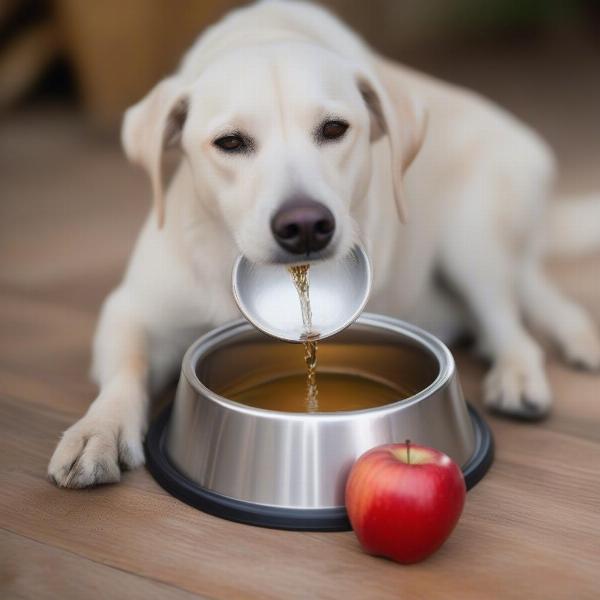Finding the best natural flea and tick treatment for your furry friend can feel overwhelming. With so many options available, it’s hard to know which ones are truly effective and safe. This article will explore various natural methods for flea and tick prevention and treatment, helping you make an informed decision to protect your beloved canine companion. We’ll cover everything from essential oils to dietary changes and grooming practices.
Understanding Natural Flea and Tick Control
Why choose natural treatments? Many pet owners are concerned about the potential side effects of chemical pesticides on their dogs. Natural options offer a gentler approach while still effectively combating these pesky parasites. They can also be a great preventative measure, keeping fleas and ticks at bay before they become a problem.
Essential Oils for Flea and Tick Prevention
Certain essential oils, like cedarwood, citronella, lavender, and peppermint, can repel fleas and ticks due to their strong scents. However, it’s crucial to use these oils safely. Always dilute essential oils with a carrier oil such as coconut or almond oil before applying to your dog. Never apply undiluted essential oils directly to your dog’s skin. Furthermore, some essential oils are toxic to cats, so keep your dog away from your feline friends after application.
Diatomaceous Earth: A Natural Insecticide
Diatomaceous earth (DE) is a natural powder made from fossilized algae. It works by dehydrating fleas and ticks, effectively killing them. Make sure to use food-grade DE, as other types can be harmful to pets. Sprinkle it on your dog’s bedding, carpets, and even lightly on their fur, avoiding the face.
Natural Flea and Tick Repellent Sprays
Several natural flea and tick repellent sprays are available on the market. Look for products containing ingredients like neem oil, geraniol, or peppermint oil. These sprays can be applied directly to your dog’s coat, providing a barrier against these parasites. Always follow the product instructions carefully.
Apple Cider Vinegar: A Multi-Purpose Remedy
Apple cider vinegar (ACV) can help create an environment that’s less appealing to fleas and ticks. Adding a tablespoon of ACV to your dog’s water bowl can help make their skin less hospitable to these pests. Some owners also use a diluted ACV spray on their dog’s coat.
 Dog Drinking Water with Apple Cider Vinegar for Flea and Tick Prevention
Dog Drinking Water with Apple Cider Vinegar for Flea and Tick Prevention
Grooming Practices for Flea and Tick Control
Regular grooming is essential for preventing and managing fleas and ticks. Thorough brushing can help remove any existing parasites and their eggs. Regular baths with a natural flea and tick shampoo can further deter these pests.
Dietary Changes for Flea and Tick Prevention
While not a standalone solution, a healthy diet can contribute to your dog’s overall well-being and make them less susceptible to parasites. A balanced diet strengthens your dog’s immune system, making them more resilient to infestations.
What are some signs of flea and tick infestation in dogs?
Excessive scratching, biting, or licking, especially around the tail base, head, and neck are common signs. You might also see small black specks (flea dirt) or the actual parasites on your dog’s skin.
How often should I apply natural flea and tick treatments?
The frequency of application depends on the specific treatment and the level of infestation. For preventative measures, weekly application is often recommended. Consult a veterinarian for personalized guidance.
Can natural remedies completely eliminate fleas and ticks?
While natural remedies can be very effective, they might not be as potent as chemical treatments in severe infestations. A combination of natural methods and regular grooming is often the best approach.
Are natural flea and tick treatments safe for puppies and senior dogs?
Most natural remedies are safe for all ages, but it’s always best to consult with your veterinarian before using any new treatment, especially on puppies and senior dogs who may be more sensitive.
Conclusion
Choosing the best natural flea and tick treatment for dogs requires careful consideration of your dog’s individual needs and the severity of the infestation. By combining various natural methods and maintaining a consistent grooming routine, you can effectively protect your furry friend from these pesky parasites. Remember to always consult with your veterinarian for personalized advice and to rule out any underlying health conditions.
FAQ
- Are essential oils safe for all dog breeds? While generally safe when diluted, some breeds may be more sensitive. Always test a small area first and consult your vet.
- Can I use diatomaceous earth indoors? Yes, food-grade DE is safe for indoor use.
- How can I prevent fleas and ticks in my yard? Regularly mowing your lawn and keeping it free of debris can help.
- What should I do if my dog has a severe flea infestation? Consult your veterinarian immediately. They can recommend the most effective treatment plan.
- Are there any natural tick collars for dogs? Yes, some collars contain natural repellents like geraniol or peppermint oil.
- Can I make my own natural flea and tick spray? Yes, many recipes are available online using ingredients like apple cider vinegar and essential oils.
- How do I choose a natural flea and tick shampoo? Look for products with natural ingredients like neem oil or essential oils.
Related Articles on ILM Dog
ILM Dog is your trusted international resource for all things dog-related. We offer expert advice on dog breeds, health, training, nutrition, grooming, and much more. We are dedicated to providing practical and reliable information to help you provide the best possible care for your canine companion. For expert advice on dog products and accessories, contact us via email at [email protected] or call us at +44 20-3965-8624. ILM Dog is here to support you and your furry friend every step of the way.